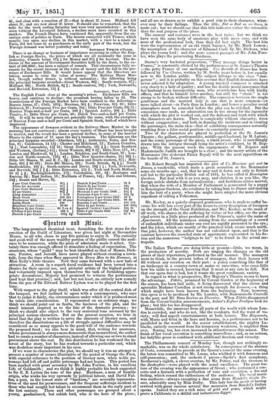Sterne's very hacknied proposition, "They manage things better in France,"
is constantly elicited by the performances at St. James's Theatre —the petty France of our metropolis. Une Bataille de Dames has been followed by Une Chaine, written by M. Scribe years before it, but equally new to the London public. The subject belongs to the class "dan- gerous " ; and it is probably on this account that English dramatists have never selected it for adaptation. A young musical composer is attached very closely to a lady of quality ; and has the double moral annoyance that her husband is an unsuspecting man, who overwhelms him with kindly offices, and that he himself loves another, but still the " chain " is too strong to be broken without difficulty. The connexion between the single gentleman and the married lady is one that is more common—or more talked about—in Paris than in London ; and hence a peculiar social atmosphere must be conceded before the play can be relished. But the concession once made, no admiration can be too strong for the ingenuity with which the plot is worked out, and the delicacy and truth with which the characters are drawn. There is complexity without obscurity, force without exaggeration ; and both in framing the incidents and in creating the personages, the main idea—that of exhibiting consequences naturally resulting from a false social position—is constantly pursued.
Two of the characters are played to perfection at the St. James's Theatre ; the gallant, gentlemanlike, middle-aged husband, by M. Lafont; and the comic personage of the piece, a timid avoue, who is unwillingly drawn into the intrigue through being the artist's confidant, by M. Reg- nier. With the present week the engagements of M. Regnicr and Mademoiselle Judith are brought to a close ; and the merry artists of the Montansier (the ci-devant Palais Royal) will be the next apparitions on the boards of St. James's.


























 Previous page
Previous page